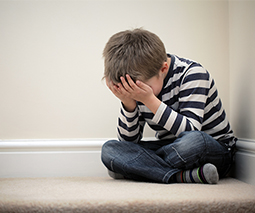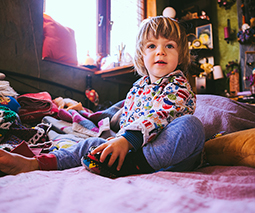Maggie Dent: How we underestimate our little boys’ feelings

For mothers, trying to communicate with sons can be challenging. Boys are wired a little differently to girls and therefore require a different approach.
Maggie Dent, parenting educator and mother of four boys, explains how to understand and nurture our boys and communicate with them more effectively.
Listen to Maggie Dent on Feed Play Love:
Men are from Mars
According to Maggie, research shows that boys’ and girls’ brains are very different, even in utero.
“Somewhere in that first 12 weeks … if it’s going to be a boy, the brain gets flooded with testosterone, so what that does is not only start the wiring in a different direction, it actually slows the brain development down.”
This means that for girls, the emotional limbic brain is far superior and they start interpreting big feelings before boys do. It also changes how boys and girls get upset. According to Maggie, when a girl gets upset, the limbic brain fires up followed by the word centre, which means they vent quickly. For boys, this takes a little longer.
“If we’re trying to interrogate a boy because of a poor choice, he is unable to respond yet because that part of his brain is still offline,” she says.
Research also shows that boys are more affected by stress. “Whether it’s a sense of disconnect with their parents or they feel no one’s included them; they get hungrier quicker and they get moody quicker; they’re often thirsty and they don’t identify thirst,” says Maggie. “So the flooding of the cortisol creates behaviour choices that are driven by pain and yet we see it so much as though they intended it.”
Little boys have big feelings
We can also underestimate what our boys are feeling.
“We often can think that if they’re not doing explosive things and hitting and pushing and shoving, then they’re fine,” says Maggie. “In actual fact, a lot of boys build up this incredible intense energy inside them and they just want to hide from everything, because it just feels ghastly.”
This is also why boys do more active play. “Vigorous play discharges that big ugly feeling through movement, not words,” says Maggie. “So, our boys actually feel equally as deeply as our girls but their capacity to understand it, to articulate it, and to work out what to do with it in terms of relationships, is just a lot more challenging for them.”
In addition, try and have some fun with them before school or daycare because it helps them deal with where they’re about to go.
“They’re trying to fill in as much fun in that cup because it reduces the stress of going into an environment that they really might only like sometimes,” she says. “So often boys’ silliness, or crazy, risky behaviour is all to do with how they’re managing the stress of being a misunderstood little lad in a world that’s often filled with a lot of women.”
Why isn’t he listening to me?
Sometimes it can be extremely challenging to get a boy to do even the simplest of tasks. Maggie says this is because they have a single focus and are easily distracted.
“Shouting or yelling across a room doesn’t always work,” says Maggie. Instead, she suggests the power of touch to get his attention.
“Rub his back, tickle him, pat him on the head, punch him on the arm gently and say, ‘Hey, I need you to go get your shoes.'”
Even then, Maggie acknowledges he might not come back, especially if he sees some Lego or a truck on the floor.
“Have everything they need to put on in the morning in one pile right near where they eat,” she suggests. “So, he eats and then steps into his clothes, he doesn’t have to go find them because he’s not good at that yet.”

Show me you love me
Boys are very visual and sensory and want you to show that you love them, rather than communicating through words.
“Some of them love cuddles and touches, some don’t, but some love it when you do loving things for them – like giving them their favourite snack after school, or maybe on your way home, saying, ‘I’ve decided we’ll go to the park,’” says Maggie. “What you’re doing is giving him an experience that fills his cup with joy and showing him you love him.”
Firm boundaries
Maggie believes that rules need to be established in a family and discussed often, perhaps have them up on the fridge. If a boy does something like hurting his sister, Maggie suggests showing him the rules and explaining that his behaviour is not okay.
“The fact that he’s hurt her has actually hurt him already. He’s already beating himself up for hurting someone he loves,” says Maggie. “So, when we come in as a parent and think, ‘I’ve got to really do something tough here’, we quadruple what he’s doing to himself.”
Maggie believes we need to then just forgive them. “They make these poor choices because of all sorts of wiring in them,” she says. “When we hit them, hurt them and shame them, we create really damaged men later who find it difficult to sometimes be open to the people they love the most.”









